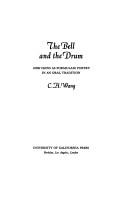| Listing 1 - 4 of 4 |
Sort by
|
Book
Abstract | Keywords | Export | Availability | Bookmark
 Loading...
Loading...Choose an application
- Reference Manager
- EndNote
- RefWorks (Direct export to RefWorks)
Chinese poetry --- Shi jing --- S12/0330 --- China: Philosophy and Classics--Shijing 詩經 Book of Poetry --- Translations into English --- Shi jing. --- 詩經 --- Shih ching --- Sigyŏng --- She king --- Che king --- Cheu king --- Schi-king --- Shi-king --- Mao shi --- Book of odes --- Sji Tsjing --- Book of songs --- Shi jing quan yi --- Shikyō --- 诗经 --- Classic of poetry --- Chinese poetry - Translations into English
Book
ISBN: 9789570524246 Year: 2009 Publisher: 臺北 臺灣商務印書館
Abstract | Keywords | Export | Availability | Bookmark
 Loading...
Loading...Choose an application
- Reference Manager
- EndNote
- RefWorks (Direct export to RefWorks)
Shi jing. --- S12/0100 --- S12/0330 --- China: Philosophy and Classics--Bibliographies, dictionaries, yearbooks and collections --- China: Philosophy and Classics--Shijing 詩經 Book of Poetry --- 詩經 --- Shih ching --- Sigyŏng --- She king --- Che king --- Cheu king --- Schi-king --- Shi-king --- Mao shi --- Book of odes --- Sji Tsjing --- Book of songs --- Shi jing quan yi --- Shikyō --- 诗经 --- Classic of poetry
Book
ISBN: 9780674067011 9781684170654 1684170656 0674067010 Year: 2012 Publisher: Cambridge, Mass.
Abstract | Keywords | Export | Availability | Bookmark
 Loading...
Loading...Choose an application
- Reference Manager
- EndNote
- RefWorks (Direct export to RefWorks)
At once a revered canon associated with Confucius and the earliest anthology of poetry, the Book of Poems holds a unique place in Chinese literary history. Since early imperial times it served as an ideal of literary perfection, as it provided a basis for defining shi poetry, the most esteemed genre of elite composition. In imperial China, however, literary criticism and classical learning represented distinct fields of inquiry that differed in status, with classical learning considered more serious and prestigious. Literary critics thus highlighted connections between the Book of Poems and later verse, while classical scholars obscured the origins of their ideas in literary theory. This book explores the mutual influence of literary and classicizing approaches, which frequently and fruitfully borrowed from one another. Drawing on a wide range of sources including commentaries, anthologies, colophons, and inscriptions, Bruce Rusk chronicles how scholars borrowed from critics without attribution and even resorted to forgery to make appealing new ideas look old. By unraveling the relationships through which classical and literary scholarship on the Book of Poems co-evolved from the Han dynasty through the Qing, this study shows that the ancient classic was the catalyst for intellectual innovation and literary invention.
S12/0330 --- S16/0190 --- China: Philosophy and Classics--Shijing 詩經 Book of Poetry --- China: Literature and theatrical art--Literary criticism --- Shi jing. --- 詩經 --- Shih ching --- Sigyŏng --- She king --- Che king --- Cheu king --- Schi-king --- Shi-king --- Mao shi --- Book of odes --- Sji Tsjing --- Book of songs --- Shi jing quan yi --- Shikyō --- Chinese poetry --- Literature. --- Belles-lettres --- Western literature (Western countries) --- World literature --- Philology --- Authors --- Authorship --- Chinese literature --- 诗经 --- Classic of poetry

ISBN: 0520024419 9780520024410 Year: 1974 Publisher: Berkeley, Calif.
Abstract | Keywords | Export | Availability | Bookmark
 Loading...
Loading...Choose an application
- Reference Manager
- EndNote
- RefWorks (Direct export to RefWorks)
Poetry --- Chinese literature --- Ballads, Chinese --- -Chinese language --- -Oral-formulaic analysis --- History and criticism --- Metrics and rhythmics --- S12/0330 --- S16/0200 --- #SML: Paul Serruys --- Formulaic analysis, Oral --- Folk literature --- Folklore --- Oral tradition --- Sino-Tibetan languages --- Chinese ballads --- China: Philosophy and Classics--Shijing 詩經 Book of Poetry --- China: Literature and theatrical art--Traditional poetry and poets: studies --- Methodology --- Chinese language --- Oral-formulaic analysis --- Shi jing. --- 詩經 --- Shih ching --- Sigyŏng --- She king --- Che king --- Cheu king --- Schi-king --- Shi-king --- Mao shi --- Book of odes --- Sji Tsjing --- Book of songs --- Shi jing quan yi --- Shikyō --- 诗经 --- Classic of poetry --- Ballads, Chinese - - History and criticism - China --- -Chinese language - - Metrics and rhythmics
| Listing 1 - 4 of 4 |
Sort by
|

 Search
Search Feedback
Feedback About UniCat
About UniCat  Help
Help News
News